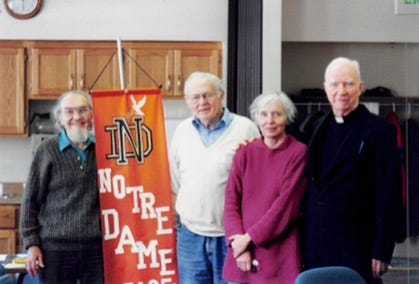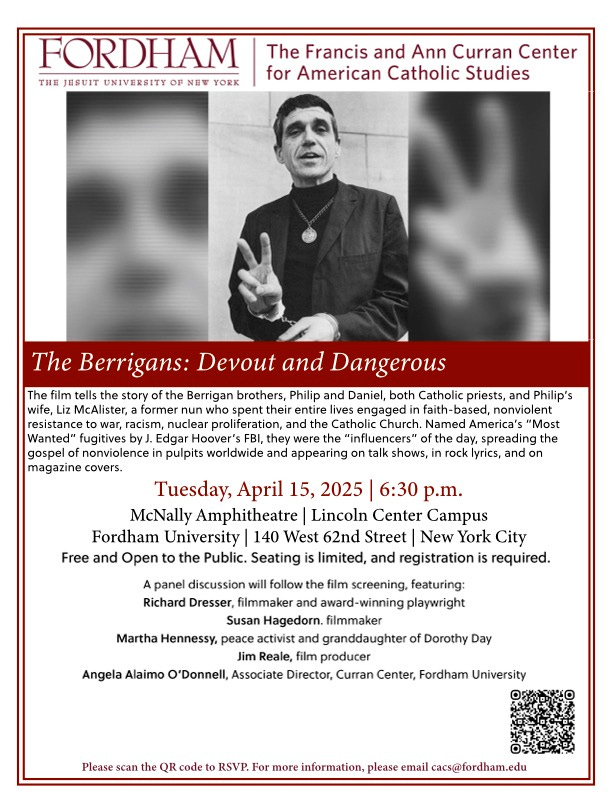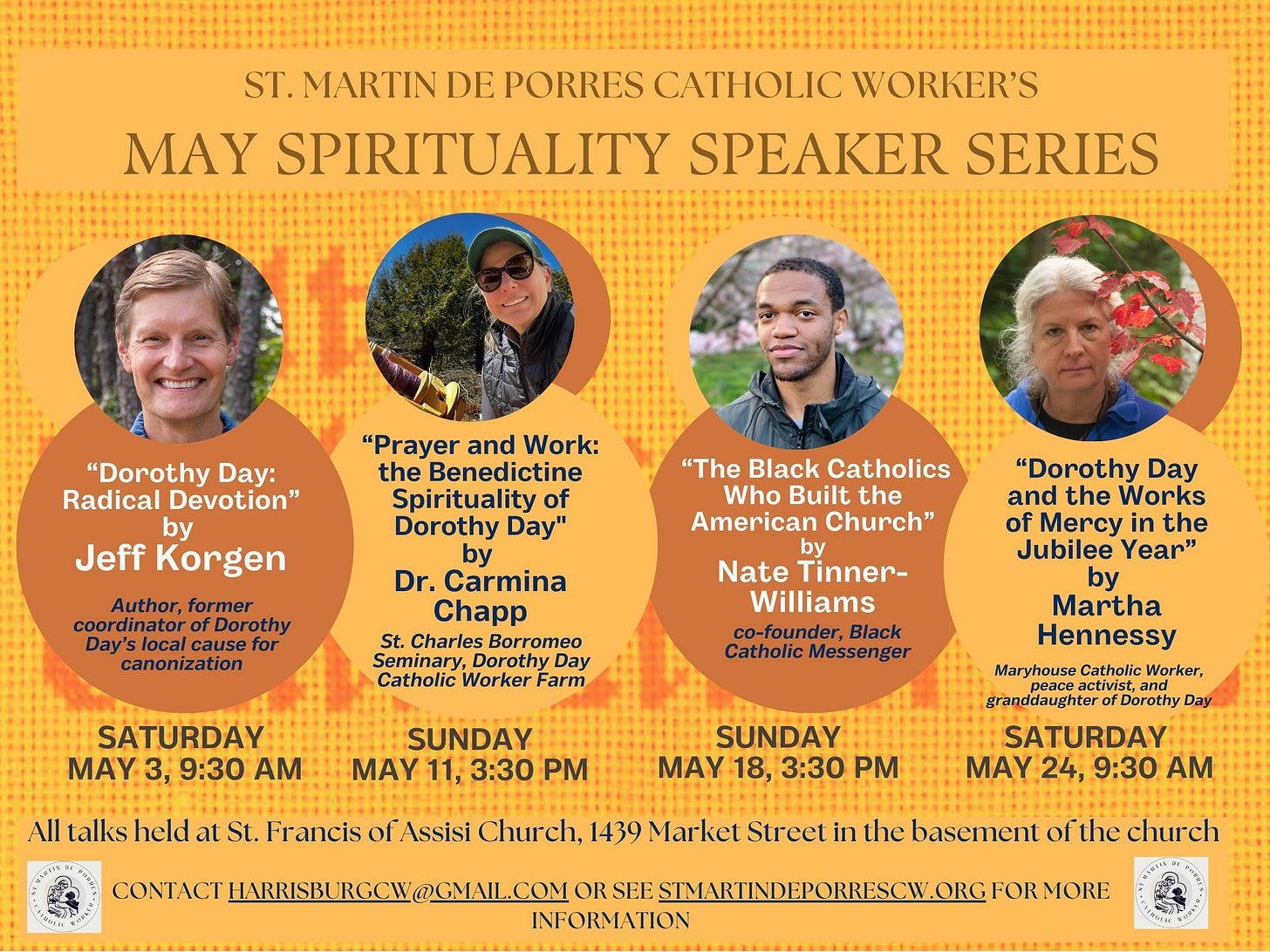"It is violence that is the exception"
The Berrigan-McAlister Award honors Omar Haramy of Sabeel Jerusalem for his peace work; Peter Maurin and Matt Harper call on the Bishops of the USA to follow the Gospel
“See how they pass the buck”
On Monday, Archbishop Timothy Broglio, president of the U.S. Conference of Catholic Bishops, issued a statement that the termination of the federal government’s contract with them “forced” them to end their Refugee Resettlement program.
I could not help but think of how Dorothy Day had predicted this predicament as she watched the Church surrender its personal responsibility for carrying out the works of mercy and rely on the support of the state, becoming more like a government contractor rather than a church.
“More and more they were taking help from the state, and in taking help from the state, they had to render to the state,” Day wrote in The Long Loneliness, in 1952. (Love Overflows, pg 151)
I thought of how wise the Peter Maurin dictum to love our neighbor at a personal sacrifice is. Even though challenging, personal responsibility is perhaps the most sustainable system of care for our neighbor. As Peter Maurin wrote,
Because the poor
were fed, clothed and sheltered
at a personal sacrifice,
the pagans used to say
about the Christians
"See how they love each other."In our own day
the poor are no longer
fed, clothed, sheltered
at a personal sacrifice,
but at the expense
of the taxpayers.And because the poor
are no longer
fed, clothed and sheltered
the pagans say about the Christians
"See how they pass the buck."
Many visitors to the Catholic Worker in its early years said they felt like they were witnessing a return to this early Christianity: a Christianity that witnessed to the world “see how they love one another.” Matt Harper, in his essay from the Catholic Agitator, calls for such a church. And Jerry Windley-Daoust interviews Lincoln Rice about tax resistance—withholding taxes, so often used for war and destruction rather than the works of mercy—as part of our call to create a society where it is easier to be good—where the buck stops with us.
peace,
Renée
Note: Roundtable will be taking off for Holy Week and Easter to fully immerse ourselves in the Sacred Triduum. We’ll be back in your inboxes with CW Reads on April 24.
FEATURED
Long Read: “The End of Too-Big-to-Fail Bureaucracies”
Matt Harper, in the most recent issue of the Catholic Agitator, makes a provocative argument for the Catholic Church to embrace voluntary poverty and the risk of personal responsibility. He writes:
Maybe our Church would find an integrity by getting back to the days where people had to want their Church so badly that they had to find each other and come together, risking much to create small community churches in their homes.
Read more below:
Long Read: The Taxman Cometh
Lincoln Rice, scholar, worker, and coordinator of tax resistance, talked with Jerry Windley-Daoust about why they are witnessing an uptick in interest in withholding taxes for peace at the National War Tax Resistance Coordinating Committee. Jerry writes:
Interest in war tax resistance has surged dramatically over the past year or so, driven in large part by concern over the U.S.-funded war in Gaza among younger and more diverse Americans, according to Lincoln Rice, a member of the Casa Maria Catholic Worker community in Milwaukee.
Read it all here:
COMMUNITY NEWS & NEWSLETTERS
A Small Step Toward Abolishing the Death Penalty in Georgia
A small win in the ongoing fight to abolish the death penalty in Georgia is the cover story in the April–May 2025 issue of Hospitality, newsletter of the Open Door Community. Mary Catherine Johnson, executive director of New Hope House, reflects on the March 2024 execution of Willie James Pye, a man with intellectual disabilities. A number of churches across the state rang bells to mourn his unjust death, Johnson writes. And a week ago, the Georgia legislature sent a bill to the governor that would lower the standard of proof for preventing the execution of intellectually disabled people. “Willie Pye’s bells are a call to action,” Johnson writes, urging readers to engage with legislative advocacy.
Inside the newsletter, John Cole Vodicka chronicles his two-year relationship with Kenyatta Booze, a mentally and physically impaired man repeatedly jailed in Athens, Georgia, for minor offenses. Read the full issue of Hospitality at opendoorcommunity.org.
Houston Catholic Worker Offering Spiritual Inquiry
“We are trying to look more deeply at a spiritual response,” writes Louise Zwick about the current national crises in the most recent edition of the Houston Catholic Worker. Dawn McCarty writes about solidarity with migrants, and another community member meditates on the Catholic hope in the life to come: the New Creation that inspires the Catholic Worker’s efforts at healing the wounds of the world today. Read more online.
Ames Romero House
The Romero House (Ames, Iowa) sent out a recent newsletter, covering its new hospitality house (called 702 Clark); its Oscar Romero Feast Day celebrations, and the city’s new Homeless Outreach program. Read more online. Separately, read a profile of the community in the Ames Tribune.
London CW Condemns Increase in UK Military Spending
The Lent/Easter edition of the London Catholic Worker newsletter editorializes against the decision of Keir Starmer’s government to increase British military spending by an additional £13.4 billion annually: “There is no moral or practical justification for wasting resources on arms, and we condemn the decision to do so in accordance with the teaching of the Church, the witness of the Gospel, and the evidence of our consciences. Jesus asks us, ‘What profit will a person have if they gain the whole world and forfeit their soul?’ Following him, we cannot buy security at this price.”
Elsewhere in the issue, Thomas Dennehy-Caddick reflects on the recent passage of assisted dying legislation and Moya Barnett offers a raw account of her time accompanying refugee women at Maria Skobtsova House in Calais, suffering in solidarity amid systemic brutality.
Read the entire issue at the London Catholic Worker website.
A New CW-Inspired Community in the United Kingdom
The latest issue of the London Catholic Worker also contains an article by Paul McGrail about Rimoaine House, a new Catholic Worker-inspired community in Birkenhead, England. A group of six are living in a corner house together, named for a deceased brother of one community member, writes McGrail. The community has hosted a few overnight guests and currently has a closed Facebook group for an internet presence. The community invites people to request access and “join our community and support the work we are doing from wherever you are.” You can do so on Facebook.
CW IN THE MEDIA
Palestinian Peace Worker Wins Berrigan-McAlister Medal
The Berrigan-McAlister Medal, named after the Berrigan brothers and Elizabeth McAlister, and the founders of Jonah House in Baltimore, and given by DePaul University, was awarded to Omar Haramy, the director of Sabeel Ecumenical Liberation Theology Center. Sabeel has hosted many Catholic Workers at its weekly Bible Studies in East Jerusalem and collaborated with Catholic Workers who work for peace in the region. Haramy told Roundtable in an email:
“Sabeel and I are thankful for this honor. We accept it with humility—for the countless Palestinians who live each day with courage, choosing nonviolence not as a strategy, but as a way of life. Here in Palestine, as in so many places around the world, people resist injustice with dignity, respond to hatred with compassion. It’s violence that is the exception—nonviolence is the everyday response of ordinary people striving for justice with extraordinary grace.”
Read more at DePaul’s Website.
Iowa City Catholic Worker Highlighted
The Iowa City Catholic Worker continues to make headlines, as the Daily Iowan interviews community member Clare Loussaert about their work organizing migrants and refugees. Read the story here.
Peace Retreat Honors Merton
Catholic Workers and other peace activists gathered together at a recent retreat at Kirkridge Retreat Center in Pennsylvania’s Poconos Mountains to mark the sixtieth anniversary of Thomas Merton’s gathering at the Abbey of Gethsemani in Kentucky, which birthed the Fellowship of Reconciliation. Elias Crim has the story at his newsletter, Solidarity Hall.
America Magazine Features Bakhita House
A recent “Cover Story” for America Magazine included a few quotes from Anne Haines, the founder of St. Bakhita House in Milwaukee, Wisconsin. The feature essay covered the Franciscan Peacemakers’ Clare Community and soapmaking business for women seeking refuge from human trafficking. Learn more about how Bakhita House collaborates with their mission at America Magazine’s website.
Uncovering Notre Dame’s Catholic Worker History
Roundtable’s own Renée Roden wrote a history of Dorothy Day and the Catholic Worker for Notre Dame Magazine. Roundtable reader and Notre Dame alumnus Mark Dellamano sent in the above 1997 photo of Julian Pleasants (far left), founder of Saints John and Paul Catholic Worker in South Bend (the first South Bend Catholic Worker, founded in 1941). Read more at Notre Dame Magazine.
Kayser Offers CW Intro to Local Church
Theo Kayser of the St. Louis Catholic Worker gave a 30-minute introduction to the Catholic Worker movement at St. Francis of Assisi Catholic Church earlier this month; you can watch the video of his talk on YouTube.
MARK YOUR CALENDAR
The Berrigans: Devout and Dangerous Screening at Fordham
Fordham University will host a screening of The Berrigans: Devout and Dangerous on April 15 at 6:30 p.m. at the McNally Amphitheatre, Lincoln Center Campus. The film profiles Philip and Daniel Berrigan and Liz McAlister—Catholic radicals known for their nonviolent resistance to war, racism, and nuclear weapons. Once labeled “America’s Most Wanted” by the FBI, they became national voices for peace. Martha Hennessy of Maryhouse Catholic Worker will participate in a panel following the film.
The event is free and open to the public. To RSVP email cacs@fordham.edu.
May Speaker Series in Harrisburg
Starting on May 3, with Jeffrey Korgen’s presentation on “Dorothy Day: Radical Devotion,” St. Martin de Porres Catholic Worker (Harrisburg, PA) is hosting a spring Spirituality Speaker Series. All talks will take place at St. Francis of Assisi Church at 1439 Market Street, in the church's basement. Learn more about each week's talk at their website.
WORDS FROM THE ELDERS
“To the Bishops of the USA: a Plea for Houses of Hospitality”
by Peter Maurin, from the October 1933 issue of The Catholic Worker
This address was originally given to the unemployed at a meeting held in September, 1933, at Manhattan Lyceum. It was published as an open letter in the Catholic Worker, addressed to the bishops meeting at the National Conference of Catholic Charities in New York.
The Municipal Lodgings
That is why you who are in need
are not invited to spend the night
in the homes of the rich.
There are guest rooms today
in the homes of the rich
but they are not for those who need them.
And they are not for those who need them
because those who need them
are no longer considered
as the Ambassadors of God.
So people no longer consider
hospitality to the poor
as a personal duty.
And it does not disturb them a bit
to send them to the city,
where they are given the
hospitality of the “Muni”
at the expense of the taxpayer.
But the hospitality that the
“Muni” gives to the down and out
is no hospitality
because what comes from the
taxpayer’s pocketbook
does not come from his heart.
Back to Hospitality
The Catholic unemployed
should not be sent to the “Muni.”
The Catholic unemployed
should be given hospitality
in Catholic Houses of Hospitality.
Catholic Houses of Hospitality
are known in Europe
under the name of hospices.
There have been hospices in Europe
since the time of Constantine.
Hospices are free guest houses;
hotels are paying guest houses.
And paying guest houses or hotels
are as plentiful
as free guest houses or hospices
are scarce.
So hospitality, like everything else,
has been commercialized.
So hospitality, like everything else,
must now be idealized.
Read Peter Maurin’s full Easy Essay here.
About us. Roundtable is a publication of catholicworker.org that covers the Catholic Worker Movement.
Roundtable is independent of the New York Catholic Worker or The Catholic Worker newspaper. This week’s Roundtable was produced by Renée Roden and Jerry Windley-Daoust. Send inquiries to roundtable@catholicworker.org.
Subscription management. Add CW Reads, our long-read edition, by managing your subscription here. Need to unsubscribe? Use the link at the bottom of this email. Need to cancel your paid subscription? Find out how here. Gift subscriptions can be purchased here.
Paid subscriptions. Paid subscriptions are entirely optional; free subscribers receive all the benefits that paid subscribers receive. Paid subscriptions fund our work and cover operating expenses. If you would like to stop seeing Substack’s prompt to upgrade to a paid subscription, please email roundtable@catholicworker.org.










